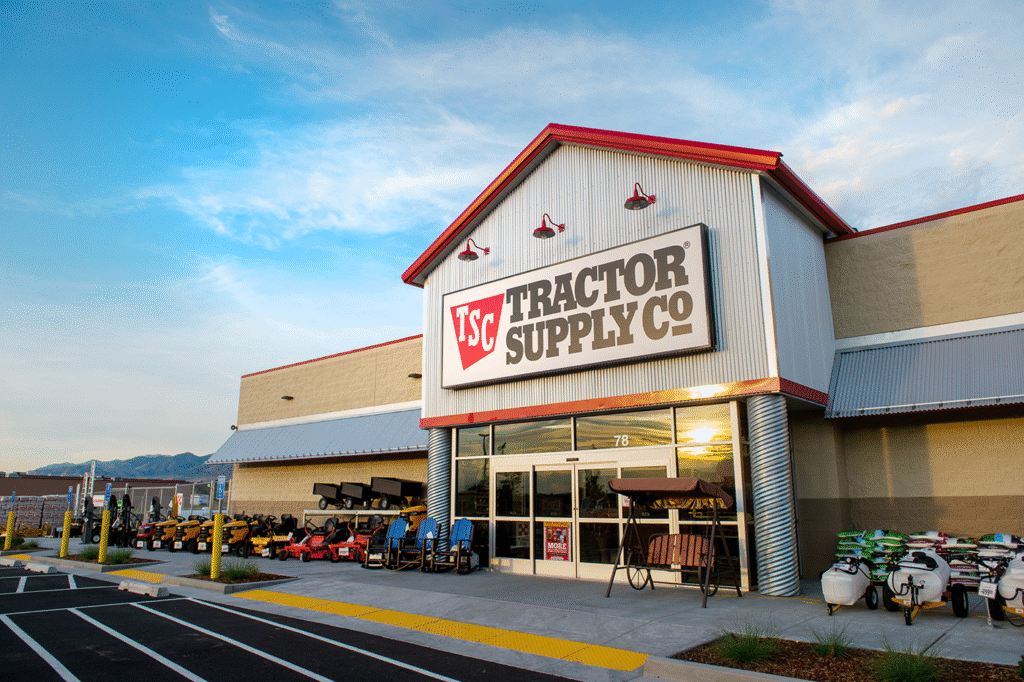Company Snapshot
Tractor Supply Company (TSCO) is the largest rural lifestyle retailer in the United States, headquartered in Brentwood, Tennessee. Founded in 1938, it operates over 2,400 stores across 49 states. The company caters primarily to recreational farmers, ranchers, homeowners, and pet owners with a mix of agricultural supplies, tools, home improvement products, pet food, and outdoor gear. TSCO is a member of the S&P 500 and has built a reputation for consistent performance, strong customer loyalty, and targeted product assortments. Its business model emphasizes private-label brands, store localization, and community-focused service.

Q1 2025 Earnings Summary
Tractor Supply reported its Q1 2025 earnings on April 24, 2025. The company posted an EPS of $0.34, which missed analysts’ expectations of $0.37. Revenue came in at $3.47 billion, a 2.1% year-over-year increase, but below the consensus estimate of $3.55 billion. Comparable store sales declined 0.9%, attributed to delayed spring weather and macroeconomic challenges. For Q2, management expects EPS in the $0.79–$0.81 range and projected full-year EPS of $2.00–$2.18, signaling modest growth despite a cautious consumer environment.
Company Origins, Products, and Expansion
Tractor Supply was founded in 1938 by Charles E. Schmidt as a mail-order catalog business for tractor parts. Its first retail store opened a year later in Minot, North Dakota. The company went public in 1959 and has steadily expanded its footprint, now operating in all but one U.S. state. It offers a diverse range of products including livestock and pet supplies, tools, lawn and garden equipment, propane, workwear, and outdoor living gear. It stocks between 15,000–20,000 SKUs per store and 125,000–150,000 online. In 2016, TSCO acquired Petsense, a specialty pet supply retailer, further expanding its market reach.
Key Competitors and Corporate Headquarters
Tractor Supply is based in Brentwood, Tennessee. It competes with large home improvement retailers like Home Depot and Lowe’s, general retailers like Walmart, and rural chains like Rural King. While Home Depot and Lowe’s dominate the general DIY and home improvement space, TSCO has carved out a unique niche by focusing on the rural and hobbyist lifestyle market.

Rural Retail Market & Growth Outlook
Tractor Supply operates within the rural lifestyle retail market, a segment that has seen a boost from post-pandemic shifts toward suburban and rural living. The DIY culture, backyard farming, and increased pet ownership have all contributed to sustained demand. Analysts expect the U.S. rural lifestyle retail market to grow at a CAGR of 4–6% through 2030. Tractor Supply is investing heavily in initiatives such as expanding its garden centers (targeting two-thirds of its store base) and enhancing omnichannel capabilities, including curbside pickup and mobile app upgrades.
Competitive Landscape
TSCO faces competition from both big-box retailers and e-commerce giants. Home Depot and Lowe’s dominate the broader home improvement space with deeper supply chain advantages and extensive inventories. Walmart competes in key overlapping categories such as pet food and seasonal products. Online retailers like Amazon are growing threats, particularly in consumables and hard goods, where price transparency and delivery speed are key.
Key Differentiators
Tractor Supply’s core differentiation lies in its laser focus on the rural consumer. The company offers a curated product mix including live animals (e.g., baby chicks), livestock feed, fencing materials, and propane refills—items not typically stocked by urban-focused retailers. Its loyalty program, “Neighbor’s Club,” private-label products (accounting for nearly 29% of sales), and emphasis on consumable, needs-based purchases (over 50% of sales) create strong customer stickiness. Its employees are often from local communities, enhancing trust and relevance with rural customers.
Leadership Team Highlights
- Hal Lawton, President & CEO: Appointed in 2020, Lawton previously served as President of Macy’s and held leadership roles at eBay and Home Depot. His tenure at TSCO has been marked by strategic digital transformation, operational expansion, and emphasis on customer-centric innovation.
Five-Year Financial Overview
From 2019 to 2023, TSCO grew revenue from approximately $8.3 billion to over $14.5 billion, reflecting a compound annual growth rate (CAGR) of about 11%. Net income also more than doubled over the same period, reaching $1.1 billion in 2023, driven by margin expansion and a favorable product mix. Earnings CAGR over five years is estimated at around 14%, aided by effective cost control, private-label margin advantages, and disciplined capital allocation. The balance sheet remains strong, with total assets of around $9.2 billion and shareholder equity near $2.1 billion. Free cash flow has been used to reinvest in stores, technology, and shareholder returns via dividends and buybacks.
Bull Case for TSCO Stock
- Continued growth in rural and suburban migration trends supports long-term category demand
- High-margin private-label products and consumables drive recurring revenue and resilience
- Omnichannel investments improve customer experience and operational efficiency
Bear Case for TSCO Stock
- Weather sensitivity and seasonality can lead to volatile quarterly performance
- Slower EPS and revenue growth compared to analyst expectations may affect valuation
- Rising competition from big-box and online retailers could pressure margins
Analyst Reactions to Earnings
While Q1 2025 results missed expectations, analysts maintained a cautiously optimistic tone, citing TSCO’s resilient fundamentals and strong brand equity. Some firms trimmed price targets modestly, but no major downgrades occurred. Investor sentiment remains steady, bolstered by guidance reaffirmation and long-term growth initiatives.
The stock is in a stage 4 bearish markdown phase on the monthly, weekly and daily charts. The support is at $43 and lots of resistance in the $53 zone, where it should head to and fall back down.
